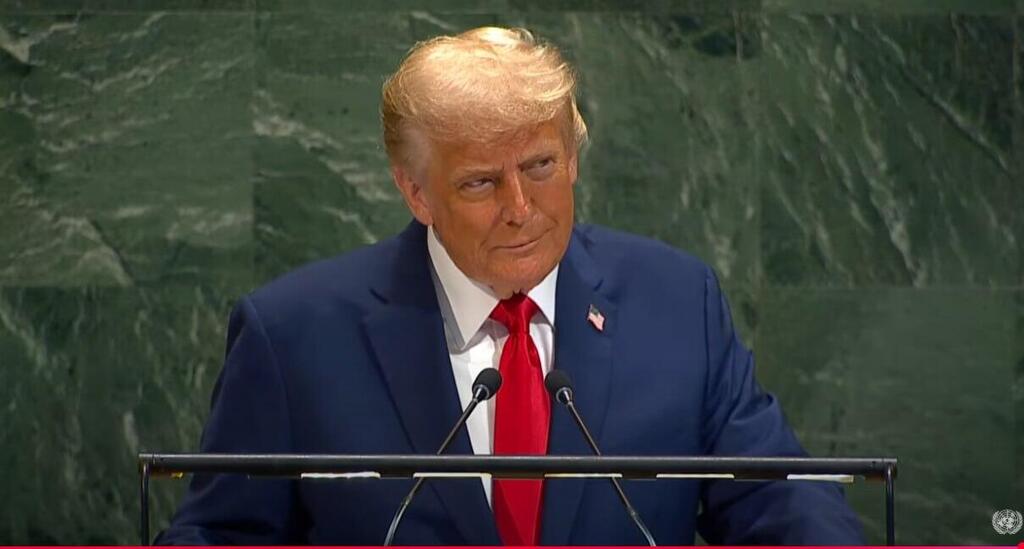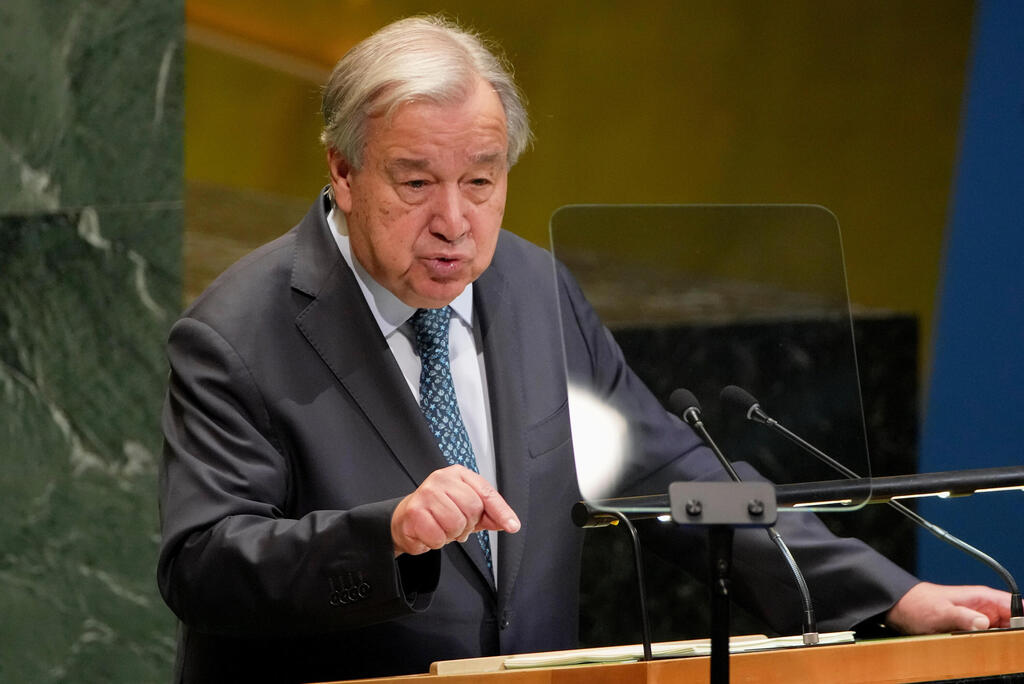U.S. President Donald Trump told the United Nations General Assembly on Tuesday that granting statehood recognition to the Palestinians at this stage would be “too great for Hamas,” arguing it would embolden extremists and undermine prospects for lasting peace.
“Those who want peace should unite behind the release of all hostages,” Trump said, referring to the estimated 20 hostages still held by Hamas in Gaza. He called for an immediate ceasefire in the Gaza Strip and stressed that any resolution must exclude Hamas from future governance. “Hamas rejects reasonable peace offers,” Trump added. “We have to stop the Gaza war immediately and get all 20 hostages back now.” Ynet Global broadcast Trump’s speech live.
The remarks came during a wide-ranging speech that touched on global conflicts, nuclear threats and the future role of the United Nations, which he criticized as falling far short of its mission.
The president reaffirmed the United States’ commitment to preventing Iran from acquiring nuclear weapons, labeling such a development a “great danger” to global stability. “Iran can never possess a nuclear weapon,” he said, drawing applause from several delegations.
Trump also delivered a sharp critique of the UN itself, saying the organization has “tremendous potential” but is “not coming close to living up to it.” “The UN wasn’t there for us,” he declared. “I had to end wars instead of the United Nations.”
Addressing the United Nations General Assembly for the first time since returning to the White House in January, Trump’s speech comes amid criticism of his unfulfilled promises to end the wars in Gaza and Ukraine and growing international recognition of a Palestinian state.
In his remarks, President Trump also reiterated his firm stance on Iran, declaring that “the world’s number one sponsor of terror cannot be allowed to possess the most dangerous weapon.” He called preventing Iran from acquiring nuclear capabilities a nonnegotiable priority for the United States.
Turning to Russia, Trump criticized Moscow’s ongoing war in Ukraine, saying it is “not making Russia look good.” He accused China and India of continuing to fund the conflict through energy purchases, and said even NATO members had failed to sever meaningful economic ties.
“If Russia is not ready to make a deal,” he warned, “the U.S. is ready to impose tariffs”—but added that for such measures to work, European countries must adopt identical steps. Trump said he plans to discuss European reliance on Russian energy with allied nations later Tuesday and urged them to immediately halt all purchases.
On weapons proliferation, Trump called on all countries to cease development of biological weapons, pledging that the U.S. would lead an international effort to strengthen enforcement of the Biological Weapons Convention. He also proposed the use of artificial intelligence for monitoring and verification.
Addressing global migration, Trump called uncontrolled migration “the top issue of our time” and accused the United Nations of contributing to the problem by funding it.
Secretary‑General António Guterres, a fierce critic of Israel, opened the assembly’s speaking portion this afternoon with a grave warning: humanity has entered “an age of reckless disruption and unrelenting human suffering.” He said the principles on which the UN was founded are under siege. Pillars of peace and progress, Guterres said, are buckling under impunity, inequality and indifference.
Guterres specifically cited conflicts in Sudan, Ukraine and Gaza. He called for a ceasefire, placing special emphasis on the Israel‑Hamas war. “In Gaza, the atrocities are nearing their monstrous third year,” he declared. “These atrocities result from decisions that deny basic humanity. The scale of death and destruction exceeds that of any other conflict in my time as secretary‑general.”
He urged the immediate implementation of interim orders from the International Court of Justice concerning Gaza—orders obligating Israel to take steps to ease Palestinian suffering. These orders are part of a case titled “Implementation of the Convention on the Prevention of the Crime of Genocide in the Gaza Strip.”
The wars in Gaza and Ukraine are expected to dominate speeches by world leaders and diplomatic activity during the General Assembly. Trump is scheduled for meetings Tuesday evening with leaders from several Arab and Muslim‑majority states, including Qatar, the United Arab Emirates, Egypt, Jordan, Turkey, Indonesia and Pakistan. He is expected to meet with Prime Minister Benjamin Netanyahu next Monday, after Netanyahu delivers his own speech to the General Assembly this coming Friday.
A U.S. official said Tuesday’s sideline summit will focus on Gaza, following reports of a new hostage deal proposal and a “personal letter” from Hamas to Trump. According to Axios, discussions will also cover U.S. plans for an Israeli withdrawal from Gaza under a future agreement and post-war governance plan in which Hamas would be excluded.
Axios also reports Washington is seeking agreement from Arab and Muslim states to deploy military forces in Gaza to enable the Israeli pullback, and to help with funding reconstruction in the territory. Indonesian President Prabowo Subianto, who has already declared readiness to send forces to Gaza, reiterated that commitment Tuesday night, at a Franco‑Saudi conference that also saw several other countries formally recognizing a Palestinian state.
The General Assembly comes as international pressure on Israel rises. At Tuesday’s conference, France, along with the small states of Malta, Monaco, Luxembourg and San Marino, officially recognized a Palestinian state. Belgium and Andorra declared recognition subject to conditions—hostage release and removal of Hamas from power. The United Kingdom, Canada, Australia and Portugal made recognition declarations a day prior.
French President Emmanuel Macron and other leaders said the moves were necessary to pressure Israel to end the war, isolate Hamas and preserve the possibility of a two‑state solution. Israel denounces the recognitions as rewarding terrorism—a charge Trump has voiced in the past.
Trump’s speech is expected to draw scrutiny amid concerns about his adversarial stance toward the United Nations. Since returning to office, he has sharply cut U.S. aid to the UN, withdrawn from a number of UN bodies, including the World Health Organization, the Human Rights Council and UNESCO and ordered a broad review of the U.S. relationship with the UN.
Last week, he called the organization poorly managed. Guterres, who has about one more year in his term, hopes to use Trump’s renewed calls for global peace to find common ground.


